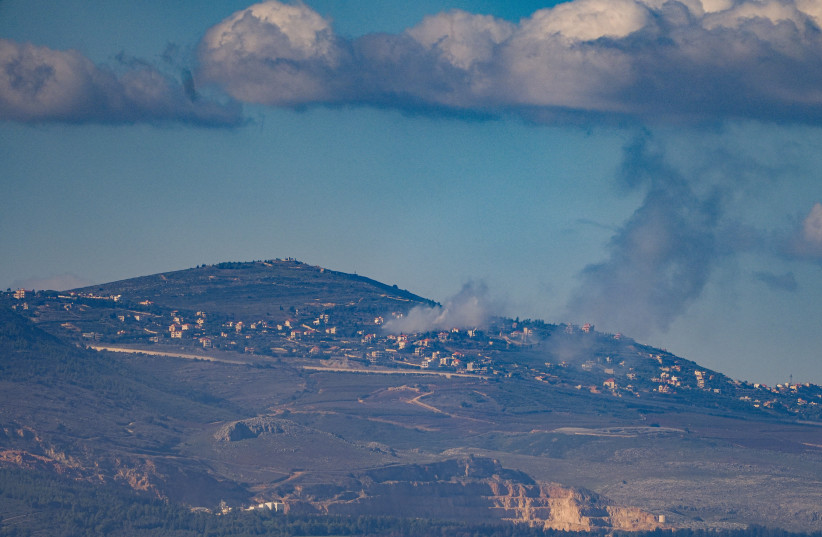Evacuated Israelis must be able to return to their homes on the country’s northern border, US Secretary of State Antony Blinken said on Saturday night as he called for a diplomatic solution to the conflict with Hezbollah.
“It is very important that Israelis have security in the North,” Blinken said as he wrapped up a trip to Turkey and Greece and prepared to head for what he said is his fourth tour of the Middle East since Hamas attacked Israel on October 7. It will include stops in Jordan, Qatar, the United Arab Emirates, Saudi Arabia, Israel and Egypt.
Blinken’s trip is focused on the Gaza war, freeing the hostages held there, and preventing an all-out war between Israel and Lebanon’s Hezbollah.
“We have an intense focus on preventing this conflict from spreading,” he said, as he noted, in particular, the plight of Israelis who had been evacuated from their homes on the northern border 90 days ago at the start of the Israel-Hamas war.
“Tens of thousands of people have been forced from their homes in northern Israel because of the threat posed by Hezbollah,” Blinken said.

“We are looking at ways – diplomatically – to try and defuse that tension so that people can return to their homes; so they can live in peace and security. This is something that we are actively working on,” he said.
The desires and needs of Israel
Israel is “clearly not interested and does not want escalation. That has been made clear from the start,” Blinken said, adding, “but they have to be prepared to defend themselves and defend their rights to live in their own country.”
He said that “from Lebanon’s perspective it is not in the interest of Lebanon to see any escalation. So the question is in large part Hezbollah and what actions it will take” and how countries with ties to Hezbollah can use their influence to calm the situation. “For us, to use our own diplomacy to see if we can find a way to produce some more sustained calm in northern Israel and southern Lebanon.”
Blinken’s expected trip to Israel this week follows a visit to Israel on Thursday by US special envoy Amos Hochstein.
Prime Minister Benjamin Netanyahu told Hochstein on Thursday that Israel is committed to bringing about a fundamental change on its border with Lebanon, according to a statement from his office. Defense Minister Yoav Gallant told Hochstein that the window for diplomacy was closing.
As part of the diplomatic blitz expected this week, German Foreign Minister Annalena Baerbock will visit Israel and Lebanon.
Counselor of the US Department of State Derek Chollet and Assistant Secretary for Near Eastern Affairs Barbara Leaf will also be in the region this week, visiting Jordan and Israel.
European Union foreign policy chief Josep Borrell visited Lebanon on Saturday and called for a diplomatic solution, including the implementation of UN Security Council 1701, which set out the ceasefire terms that ended the Second Lebanon War. That resolution mandates that the only armed group that can exist on Israel’s border is the Lebanese army and not a non-state actor such as Hezbollah.
“I think that the war can be prevented, has to be avoided, and diplomacy can prevail to look for a better solution,” Borrell said during a joint press conference with Lebanese Foreign Minister Abdallah Bou Habib.
“It is imperative to avoid a regional escalation in the Middle East, it is absolutely necessary to avoid Lebanon being dragged into a regional conflict. This is the last thing Lebanon needs,” Borrell stated.
“More than 70,000 civilians have already been displaced in Lebanon, 200,000 in northern Israel. Almost 50,000 olive trees have been burnt on the border,” he explained.
“Nobody stands to gain from a regional conflict,” Borrell said, adding that he was directing this message to both Israel and Hezbollah.
“Diplomatic channels have to be open to signal that the war is not the only option, is the worst option, and to keep working on a diplomatic solution,” he said during a joint press conference with Lebanese caretaker Foreign Minister Abdallah Bou Habib.
Lebanon is committed to de-escalating the situation Habib said – and wants to see the full implementation of Resolution 1701. He cautioned, however, that “the only political solution that will put an end to the conflict in the Middle East is to end the Palestinian conflict.”
The IDF said Saturday that 40 “launches” from Lebanon toward the area of Meron were identified. There were no reports of casualties or damage. Hezbollah said it had hit a key Israeli observation post with 62 rockets as a “preliminary response” to the killing of Hamas deputy chief Saleh al-Arouri on Tuesday.
Tensions have been especially high in the area since Arouri was killed by a drone in the southern suburbs of Beirut – a stronghold of Hamas’s Lebanese ally Hezbollah – in an attack widely attributed to Israel.
On Saturday night, Netanyahu issued a video statement expressing his determination to destroy Hamas.
“Three months ago, Hamas committed a terrible massacre against us. My government directed the IDF to go to war to eliminate Hamas, return our hostages, and ensure that Gaza will never again be a threat to Israel. The war must not be stopped until we achieve all of the goals. We will not give Hamas any immunity whatsoever, and we will fight until we restore security in both the South and the North,” Netanyahu stated.
Reuters contributed to this report.
